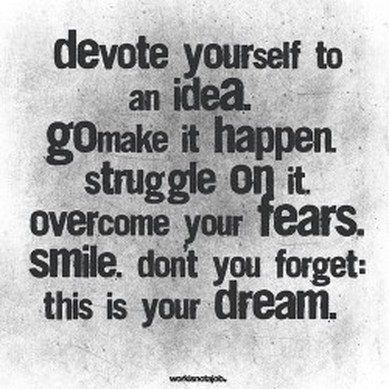
I remember meeting with a career counselor several years ago. I had expressed an interest in becoming an art therapist. The counselor suggested that I had “too much empathy” to be a therapist and recommended that I become a librarian. The latter is a respectable career but it’s not my dream job. I’d do it and probably enjoy it to a degree, but I’d be stuck in that wanting something more space. I wanted to help people with art before I knew art therapy existed, and I still do.
Recently, I have been thinking about quitting my program, based on niggling doubts that I will not make a good art therapist. Expressing this doubt is usually met with protests and reassurances. People are uncomfortable with it. But please sit yourself down with a cup of joe and let me explain.
I understand I have been working hard and spending years to get me where I am now. At best, the doubt helps by mobilizing me. It makes me question. It makes me reflect on my
actions and choices. It keeps me humble and reminds me that I am learning. It reminds me that I’m working with human beings who know themselves better than I do, and whatever happens is ultimately their choice. I cannot control everything. It’s not about me.
At worst, the doubt debilitates me and makes me feel inadequate and hopeless as a practitioner. It tells me that I’ve ruined a client’s life in a single session by not asking
questions or making comments that are insightful or “therapist-y” enough. Years
of work and potential for future growth mean nothing when doubt takes over.
I think it’s a good thing that I have my doubts. I would be concerned if I thought my therapeutic techniques were flawless or I was always helpful to clients. This is my ongoing
struggle: finding the balance of being humble about knowing my limits, without
losing confidence in the ability to help others heal.
Art therapists adapt. It makes sense that I need to engage in continuous reflection of my
abilities and doubts as I grow. After all, these doubts make (seemingly) small
triumphs with clients become more numerous and immense.
~Carla DePalma
TLOTH Clinical Intern
2014 MAT Candidate, Adler School of Professional Psychology
Recently, I have been thinking about quitting my program, based on niggling doubts that I will not make a good art therapist. Expressing this doubt is usually met with protests and reassurances. People are uncomfortable with it. But please sit yourself down with a cup of joe and let me explain.
I understand I have been working hard and spending years to get me where I am now. At best, the doubt helps by mobilizing me. It makes me question. It makes me reflect on my
actions and choices. It keeps me humble and reminds me that I am learning. It reminds me that I’m working with human beings who know themselves better than I do, and whatever happens is ultimately their choice. I cannot control everything. It’s not about me.
At worst, the doubt debilitates me and makes me feel inadequate and hopeless as a practitioner. It tells me that I’ve ruined a client’s life in a single session by not asking
questions or making comments that are insightful or “therapist-y” enough. Years
of work and potential for future growth mean nothing when doubt takes over.
I think it’s a good thing that I have my doubts. I would be concerned if I thought my therapeutic techniques were flawless or I was always helpful to clients. This is my ongoing
struggle: finding the balance of being humble about knowing my limits, without
losing confidence in the ability to help others heal.
Art therapists adapt. It makes sense that I need to engage in continuous reflection of my
abilities and doubts as I grow. After all, these doubts make (seemingly) small
triumphs with clients become more numerous and immense.
~Carla DePalma
TLOTH Clinical Intern
2014 MAT Candidate, Adler School of Professional Psychology
 RSS Feed
RSS Feed
